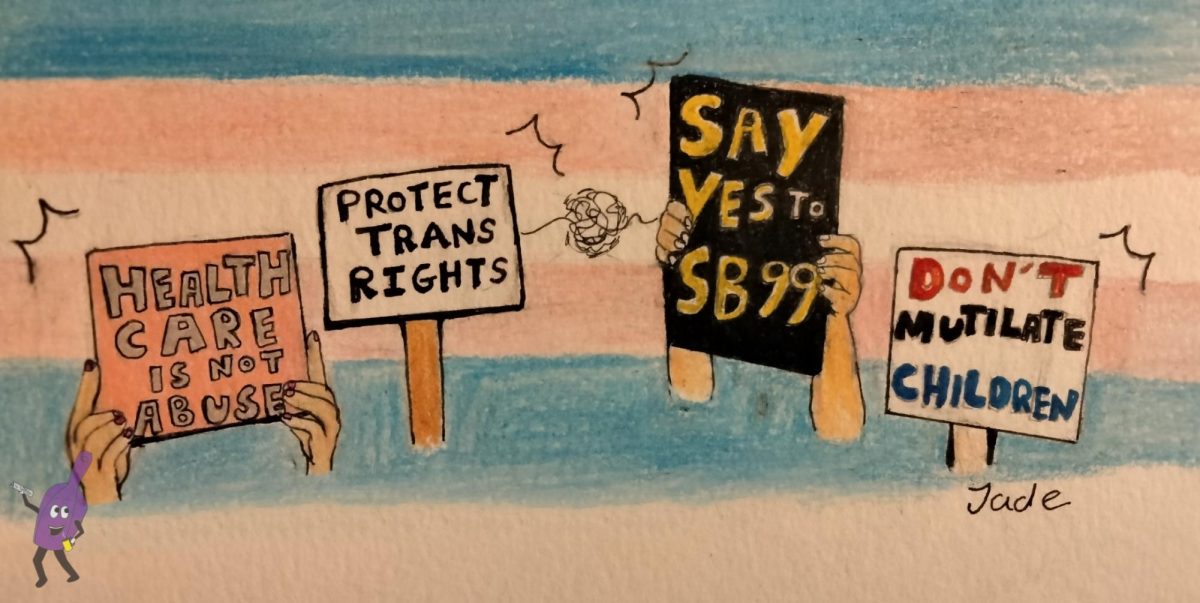WARNING: The following article contains information about suicide, depression, and self-harm.
The 2023 Montana legislative session was highly controversial, reflecting the tensions of America’s current political climate. Across the country, the topic of trans gender-affirming healthcare has been up for debate. One bill that has sparked much outrage for the LGBTQ+ community is Montana Senate Bill 99.
SB99 is a bill outlining a ban on medical gender-affirming care to minors. The bill specifically prohibits administering hormone replacement therapy (HRT), puberty blockers, or surgical procedures exclusively for affirming any “female minor’s perception that her gender or sex is not female or a male minor’s perception that his gender or sex is not male.”
The bill, sponsored by Kalispell Representative Robert Fuller (R), aims at protecting the well-being of minors. Those in support of these bills claim that HRT is risky and poses many health risks along with the irreversible effects of puberty. This is to be done by suspending the license of any healthcare provider that administers medical or surgical treatment for gender dysphoria.
Gender dysphoria is defined by the American Psychiatry Association as “psychological distress that results from an incongruence between one’s sex assigned at birth and one’s gender identity.” It is a symptom often experienced by transgender individuals and is diagnosable by medical professionals. The most widely accepted treatment for gender dysphoria is gender-affirming care.
This bill quickly led to protests as it progressed. In a legislative hearing, Missoula Representative Zooey Zephyr (D) stated that those who vote to pass this legislation would “see blood on their hands”. Zephyr is the first trans woman to hold office as a Montana lawmaker, and her status as such has put her in the spotlight.
This controversial outburst, as some see it, ended in the suspension of Zephyr from the floor. This was due to increased protests during hearings, with many being arrested in the capitol building.
SB99 caught the attention of the Montana ACLU. In response to the bill being signed into law, along with Lambda Legal, they filed a lawsuit. They claimed “Montana’s ban is a direct assault on the freedom and well-being of transgender youth, their families, and their medical providers,” Attorney Malita Picasso with the ACLU stated.
The hearing for the case was held on September 18, at the Missoula Courthouse. Prior to the hearing, people gathered on the lawn to show their support for the LGBTQ+ community. Signs displaying “TRANS PEOPLE BELONG IN MONTANA and we’re happy you’re here!” were spread throughout the perimeter.
News outlets interviewed community members as many spoke out against the oppression of trans people. Organizations such as the Center, Forward Montana, and Empower Montana held a presence at the scene.
The courtroom filled quickly as political organizers, trans youth, and spectators gathered, overflowing into the hall. The plaintiffs were seated in the front, accompanied by the ACLU legal team, headed by Malita Picasso. Sitting perpendicular to them was the defense legal team for SB99, headed by Michael Russell.
Picasso opened by negating an opposing claim that dysphoria is just “the unhappiness of adolescence”. She cited the high levels of depression and suicide among the transgender community, claiming that trans youth will “suffer irreparable harm if the effects of SB99 occur”, however, the defensive side claims the same for the use of gender-affirming care.
Picasso claims SB99 is unconstitutional under both the federal and more specifically MT Constitution. She cites this under the Montana Equal Protection Clause, the right to privacy, and the right of parents to advise their children’s medical care. Russell claims the state has oversight over all medical care, but Picasso responds by stating that medical professionals and parents can make informed decisions.
Plaintiffs’ testimonials describe the individual struggles of trans youth. Multiple described feeling hopeless until beginning their medical transition. Two parents wrote that they fear that with the passing of this bill, their daughter will take her life.
Plaintiffs described the struggle to get access to hormone therapy, whereas a cisgender (someone identifying with their assigned sex at birth) minor can access the same therapy for different purposes. Picasso used this to highlight that risks associated with this care would apply to those youth as well.
On behalf of the defendants, attorney Michael Russell speaks. Russell claims that gender-affirming care is too risky and experimental, with potential for adverse side effects. He claims that the use of HRT for treating gender dysphoria is not the FDA-approved use of the drugs. Picasso cites that the FDA recognizes the use of approved medications for other treatments.
Russell discusses the fact that medical professionals are not in a full consensus about the use of gender-affirming care. He cites a 2006 Dutch protocol, involving the use of puberty blockers, claiming that other European countries saw harm and “reversed course”.
In response to the high levels of suicidality, Russell claims that there is no sign that suicide will be reduced with gender-affirming care. This is contradictory to plaintiffs’ claims that the care saved their lives. Russell claims that the better way to combat the issue is through talk therapy.
Picasso describes this method of care as the “wait and see” method and warns of the danger. She claims that by not using the most effective form of care trans youth will be put at risk of adverse mental health effects.
Russell brings to light the experiences of those who de-transition, showing the effects of gender dysphoria caused by unneeded treatments. Picasso responds by explaining the proper process of diagnosis and providing care to minors, including referrals from multiple specialists. She claims that the majority of transgender individuals do not desist, however, Russel states that those who do cannot be ignored.
One of the biggest fears of those in opposition to the transition of minors is the loss of fertility. Russell pleads, “Kids of Montana deserve better. They have one shot at growing up. This is what the people want. Give them the chance to make the right decision”.
The district court judge has as of September 27, 2023, ruled in favor of the plaintiffs. The preliminary injunction being granted guarantees the current protection of gender-affirming care for minors. This is a sigh of relief for many families, however, the tension of the issue is not alleviated. As stated by the district judge, there will be pushback regardless of the ruling, and this fight is not over.









